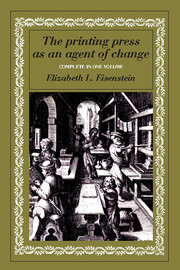Crossref Citations
This Book has been
cited by the following publications. This list is generated based on data provided by Crossref.
Christie, J. R. R.
and
Golinski, J. V.
1982.
The Spreading of the Word: New Directions in the Historiography of Chemistry 1600–1800.
History of Science,
Vol. 20,
Issue. 4,
p.
235.
MARVIN, CAROLYN
1984.
CONSTRUCTED AND RECONSTRUCTED DISCOURSE.
Communication Research,
Vol. 11,
Issue. 4,
p.
563.
Kaestle, Carl F.
1985.
Chapter 1: The History of Literacy and the History of Readers.
Review of Research in Education,
Vol. 12,
Issue. 1,
p.
11.
MCGREGOR, GAILE
1986.
A view from the fort: Erving Goffman as Canadian.
Canadian Review of Sociology/Revue canadienne de sociologie,
Vol. 23,
Issue. 4,
p.
531.
Markus, Gyorgy
1987.
Why Is There No Hermeneutics of Natural Sciences? Some Preliminary Theses.
Science in Context,
Vol. 1,
Issue. 1,
p.
5.
Shapin, Steven
1988.
Robert Boyle and Mathematics: Reality, Representation, and Experimental Practice.
Science in Context,
Vol. 2,
Issue. 1,
p.
23.
Monas, Sidney
1989.
Perspectives on Literature and Society in Eastern and Western Europe.
p.
7.
Dennis, Michael Aaron
1989.
Graphic Understanding: Instruments and Interpretation in Robert Hooke'sMicrographia.
Science in Context,
Vol. 3,
Issue. 2,
p.
309.
Goldstein, Robert Justin
1989.
Political Censorship of the Arts and the Press in Nineteenth-Century Europe.
p.
26.
Goodrich, Peter
1989.
Rhetoric, grammatology and the hidden injuries of law.
Economy and Society,
Vol. 18,
Issue. 2,
p.
167.
James, Carmen Luke
1989.
SOCIAL CONTROL AND THE STANDARDIZATION OF THE WORD: Luther and Melanchton's Curriculum.
Discourse: Studies in the Cultural Politics of Education,
Vol. 9,
Issue. 2,
p.
69.
Lagrange, Pierre
1990.
Enquêtes sur les soucoupes volantes.
Terrain,
Vol. 14,
Issue. ,
p.
92.
McGill, Kathleen
1990.
Improvisatory competence and the cueing of performance: The case of the commedia dell'Arte.
Text and Performance Quarterly,
Vol. 10,
Issue. 2,
p.
111.
HAAS, CHRISTINA
1990.
Composing in Technological Contexts.
Written Communication,
Vol. 7,
Issue. 4,
p.
512.
Smith, Catherine Delano
1990.
Maps as ArtandScience: Maps in Sixteenth Century Bibles.
Imago Mundi,
Vol. 42,
Issue. 1,
p.
65.
Law, John
1990.
Power, Discretion and Strategy.
The Sociological Review,
Vol. 38,
Issue. 1_suppl,
p.
165.
RITCHIE, L. DAVID
1991.
Another Turn of the Information Revolution.
Communication Research,
Vol. 18,
Issue. 3,
p.
412.
Luke, Carmen
1991.
The making of the child TV viewer: A poststructuralist agenda for conducting the history of research on mass media and children.
Howard Journal of Communications,
Vol. 3,
Issue. 1-2,
p.
14.
Johnston, Stephen
1991.
Mathematical practitioners and instruments in Elizabethan England.
Annals of Science,
Vol. 48,
Issue. 4,
p.
319.
Dröge, Franz
and
Kopper, Gerd G.
1991.
Der Medien-Prozeß.
p.
262.



